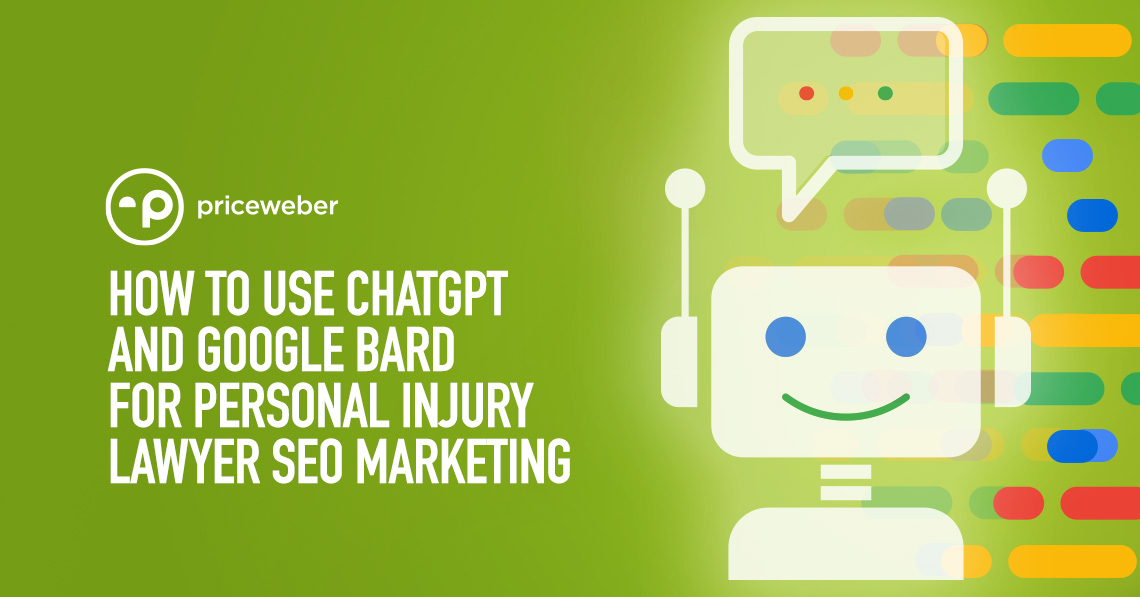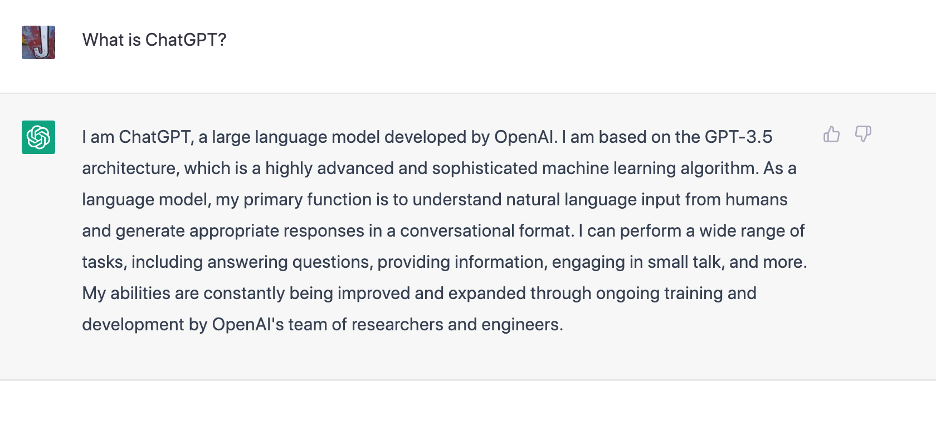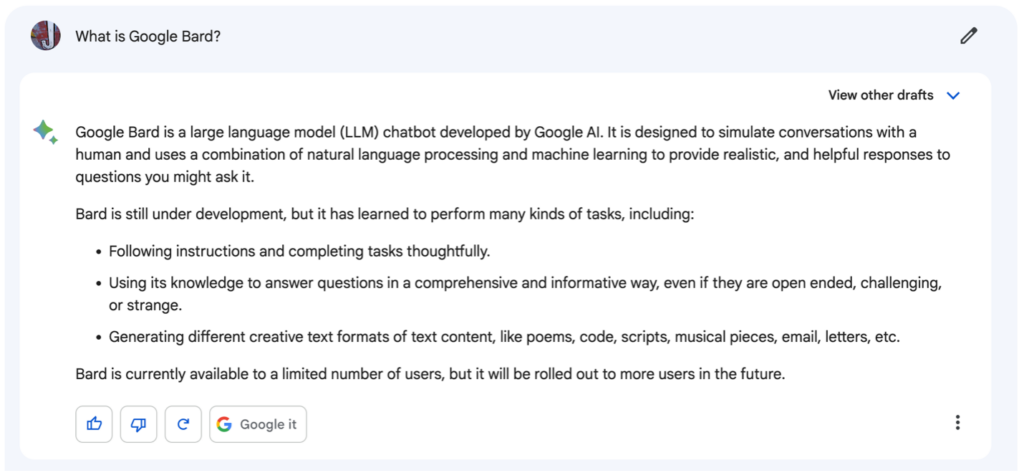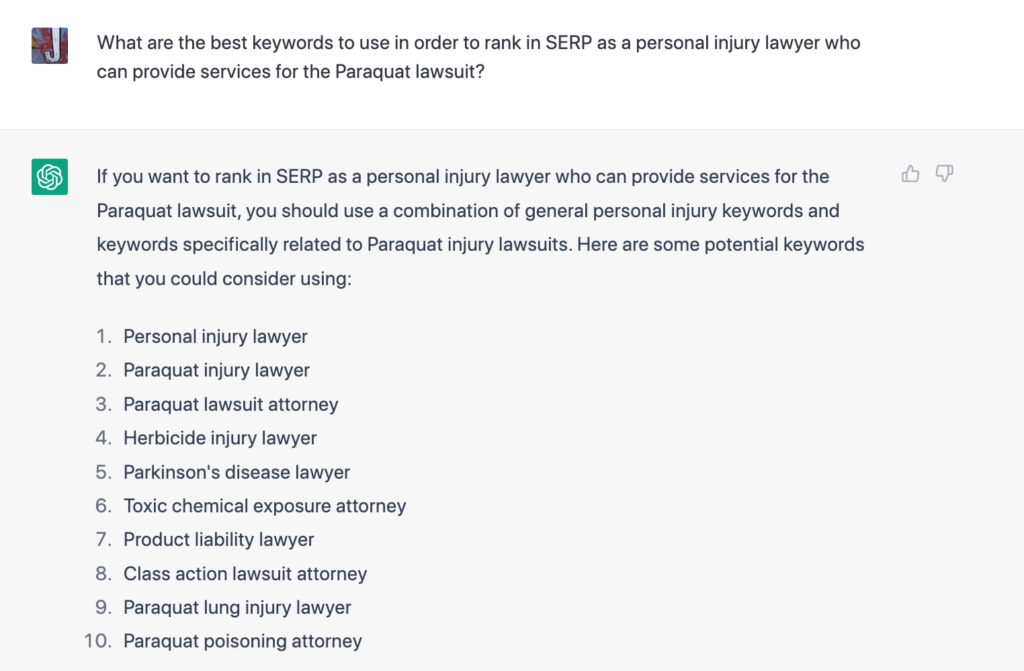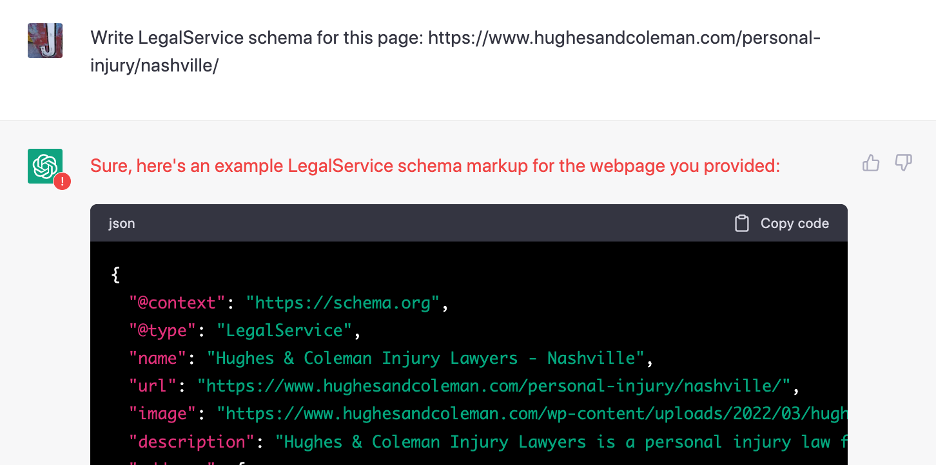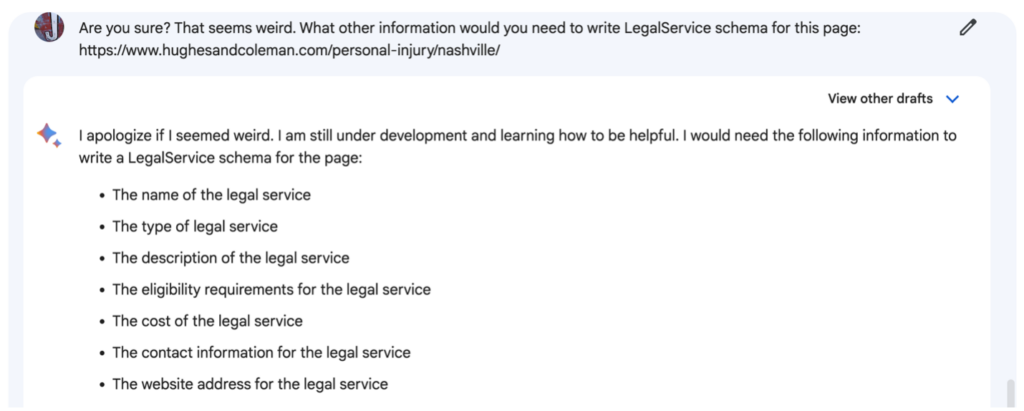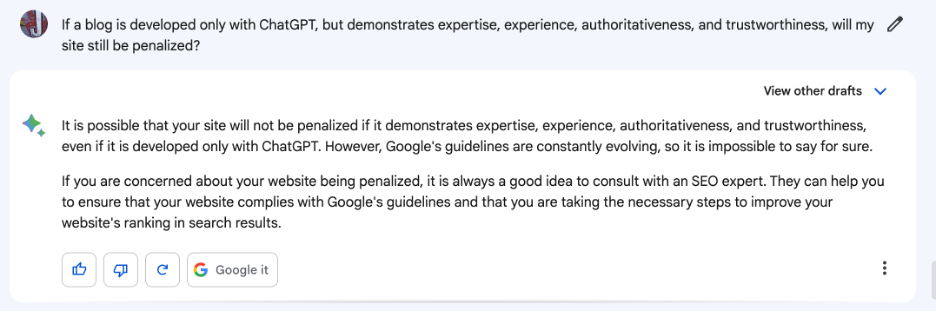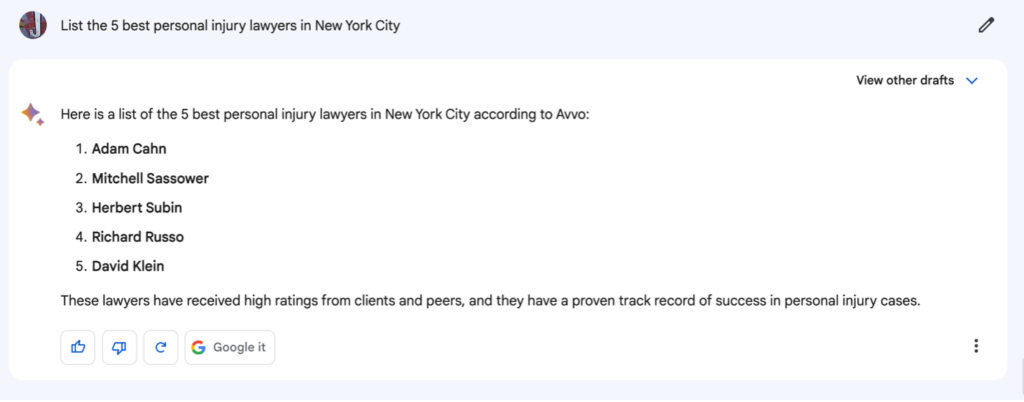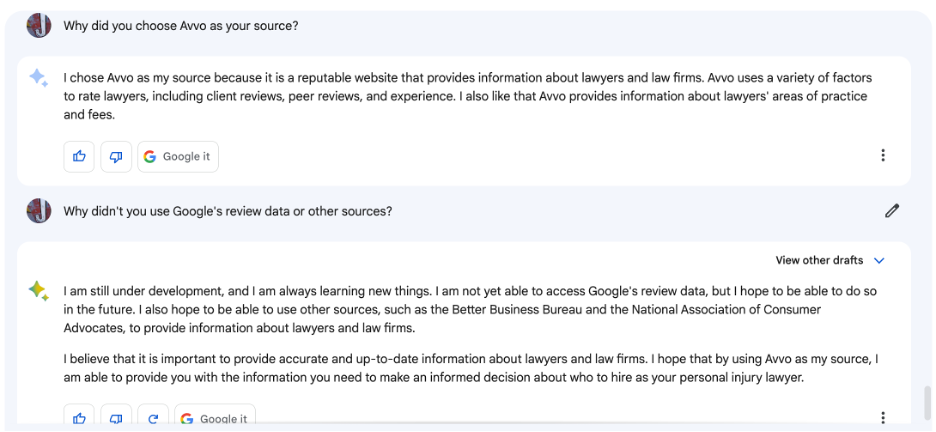Personal Injury Lawyer SEO Marketing
For injury law firms, ChatGPT and Google Bard are already making an impact, and if you haven’t heard of these tools, no matter what industry you’re in, in this edition of “Plain Talk,” we’ll get you up to speed. Both AI models are in their early stages, but we’ve already been able to identify some exciting use cases on how to up your personal injury law content game while gaining some valuable insights from Google along the way. If you want to understand how ChatGPT and Bard can help you with things such as keyword research, structured data, content development, technical SEO, and better understanding Google search, we will demonstrate by showing how these tools can help boost your online performance. And, of course, we’ll be getting some answers straight from the tools to demonstrate how intelligent they can be. Let’s dive in.
What Is ChatGPT?
As ChatGPT itself tell us, it is a machine learning algorithm developed by OpenAI. And it’s smart. So smart the ChatGPT version four alleges it is capable of even passing the uniform bar exam. Under the hood of this powerful tool is something called a language model, which uses statistical and probabilistic techniques to determine the probability of a given sequence of words occurring in a sentence. To do this effectively, ChatGPT uses natural language processing (NLP) to output responses in a way that sounds conversational or “natural.” In simple terms, it is really good at sounding like a human and providing (mostly) accurate responses. Natural language processing and natural language models (NLMs) are nothing new. Chances are you’ve already used one in the form of a “Hey Google,” map search, or voice command for Alexa, but what we’re looking at here is much more advanced and sophisticated due to the data sets that ChatGPT was trained on, in combination with human trainers who actually work to fine-tune the model by manually inputting which outputs are the best based on the questions asked.
What Are the Data Sets That ChatGPT Has Been Trained On?
ChatGPT has been trained on a variety of huge text datasets, which are collections of written language that have been used to teach the model how to understand and generate natural language. By training on these large and diverse datasets, ChatGPT is able to learn from a vast amount of real-world language data, which helps it to generate more natural and realistic responses to a wide range of questions and prompts.
What Is Google Bard?
Google Bard is similar to ChatGPT in a lot of ways, but also very different. Google Bard is also a large language model. Large language models (LLMs) are a type of natural language model (NLM) that have been trained on massive amounts of text data. LLMs are able to generate text that is similar to human-written text, and they can also be used for tasks such as translation, question answering, and summarization.
Is Google Bard Better Than ChatGPT?
Bard, developed by Google AI, is trained on a massive dataset of text and code, and it has the ability to access and process current-to-the-moment information through Google Search and keep its response consistent with search results. Meanwhile, ChatGPT, developed by OpenAI, is trained on a large dataset of text and code, but it does not have the ability to access and process information from the internet.
While both are very smart tools and are getting smarter daily, the big takeaway here is that Google Bard can access the internet, and ChatGPT cannot. For personal injury law SEO and content development, Bard delivers a huge advantage because, at the end of the day, you want to rank in Google. However, as you’ll see, ChatGPT still has some tricks that make using both tools the best choice (for now).
Boosting Firm Online Performance With Bard
So, what are some of the more effective applications for Bard and ChatGPT? These five are our recommendations for how you can start generating business performance with Bard today.
1. Using Bard and ChatGPT for keyword research
When looking at keyword research (what keywords to include in your content), there is a lot to consider and some questions you’ll need to answer. On a basic level, you’ll want to understand the following:
-
- Search volume (how many people are searching for that term.) If no one is searching for what you’re writing about or not searching for your content in the way you think they are, is it worth the time and effort it takes to actually compose it? In most cases, the answer here will be a hard no.
- The difficulty of ranking for that term (what does the competition look like?)
- The intent of the keyword (informational or transactional?)
- Business value (how important is ranking for a particular term to your business revenues and success?)
When evaluating keywords to target, ensure that they align with your overall content strategy and goals to help you formulate a plan that will maximize your dollars.
If you have a strategy in place, both Google Bard and ChatGPT can be helpful. For example, let’s say we wanted to identify keywords to help us rank for a recent mass tort centered around Paraquat, an herbicide that has been linked to Parkinson’s Disease. For this exercise, we will ask Bard and ChatGPT for keywords that would be helpful in our goal to rank.
Google Bard has some suggestions, such as “Paraquat Lawsuit Lawyer” and “Paraquat Lawsuit Lawyers,” along with others that are directly related to our topic – nice!
What does ChatGPT have to say?
ChatGPT provides some additional terms that Bard didn’t provide, such as “Paraquat Injury Lawyer,” “Paraquat Lawsuit Attorney,” and others.
With only using Bard and ChatGPT, we are starting to compile a pretty good seed list of keywords. However, they each should also be evaluated on a more granular level in a platform such as Ahrefs – which we will do right now.
Are ChatGPT and Bard keyword research outputs helpful, and do they meet the criteria we’ve set in place?
Using Bard’s suggestion of “Paraquat Lawsuit Lawyer,” we can see in Ahrefs that this term has a relatively low Keyword Difficulty score (KD), which means that it is attainable to rank; however, the volume is fairly low at 100. Low volume doesn’t mean a keyword should be discarded, but it may not be “the one” to go after.
Digging deeper, we see the parent topic of “Paraquat Lawyer.”
Neither ChatGPT nor Bard suggested this exact match term in our initial query, but as we begin to look at “Paraquat Lawyer,” we are beginning to see a keyword that may be worth pursuing as a primary. The potential volume for this term is nearly five times the amount of “Paraquat Lawsuit Lawyer” while retaining the same KD of six. It is a good candidate.
But let’s keep going and dive a little deeper into related terms.
When looking at terms related to “Paraquat Lawyer,” we begin to see that “Paraquat Lawsuit” has significantly more volume at 3.5k, and although the KD is higher at 16, it is still attainable with some effort. Both Bard and ChatGPT originally suggested “Paraquat Lawsuit” in different broad match forms where terms were appended after the primary keyword, such as “Paraquat Lawsuit Lawyer” in the case of Bard and as “Paraquat Lawsuit Attorney,” as an output from Chat GPT, which we have validated as being viable keywords to include.
After this exercise, in one example, we’ve been able to take one suggested keyword by Bard and verify its value. From here, we can explore how to incorporate it into our content to drive traffic organically. We’ve also demonstrated how Bard and ChatGPT can help to provide a wide range of initial keywords that you can validate and decide if they are worth incorporating into a piece of content.
Although Bard and ChatGPT can help in developing target keywords and semantic keywords, they should enhance your SEO technical stack and not replace tools that are designed specifically for this purpose. Continue to use tools such as Ahrefs, SEMrush, Moz, and others, while layering Bard or ChatGPT on top.
2. Schema markup and structured data
As all personal injury lawyer SEO agencies know, schema markup is extremely important. It helps search engines understand the meaning of your content and how it is related to other content. This information can help search engines display your content in more relevant ways in search results.
When it comes to schema markup, let’s see how ChatGPT and Bard stack up.
In this query, we’ve asked both ChatGPT and Google Bard to create a “LegalService” schema for a personal injury lawyer landing page without providing any other information other than the URL.
ChatGPT gives it a shot and provides code that can be implemented directly into the header or footer of the page. However, because it is not directly connected to the web and pulling from data that may not be the most recent, it is important to note that ChatGPT missed the mark on some key elements, including the firm’s address, which is a very big miss.
Using the same query, Bard doesn’t seem up to the task. But Bard is still learning, so let’s give it another go.
After apologizing politely for seeming weird, Bard responds with some additional information that would be required for this task to be completed.
What we can learn from this is that ChatGPT and Bard are not quite there yet when it comes to fully analyzing a page, and every output should still be verified by a human. There is no doubt that both will get to a point when the available information on the web can be pulled into an acceptable schema output, but they’re still in the learning mode, so it will take some time.
3. Using Bard and ChatGPT for content development
If your homepage or location pages are the heart of your personal injury law firm’s website, then surely, it’s your blog that keeps it all pumping. But to keep everything moving upwards in search engine results, you need a constant stream of high-quality content being developed frequently, and depending on the size of your firm, you may need this at scale.
Will Google penalize a law firm for using AI to create content?
Google uses the acronym “E-E-A-T” to define high-quality content, relying on articles displaying “expertise, experience, authoritativeness, and trustworthiness.” In line with this, Google’s guidelines for publishers tell them to avoid “automatically generated content intended to manipulate search rankings.” Google wants helpful content, as they have explicitly communicated via the latest Helpful Content Update. But what about if the content generated exclusively by AI tools meets the “E-E-A-T” criteria? Let’s ask Bard:
Bard’s output here is laced with a response that SEO and content strategists are all-too-familiar with – “it depends.”
For now, it is possible that your injury law firm’s website won’t be penalized for posting blogs exclusively written by Bard or ChatGPT, but it is important to note that the content still needs to meet the E-E-A-T criteria. It is equally important to understand that Google can change its guidelines around AI-developed content at any time and that AI does not replace thought leadership.
Developing content by only using Bard or ChatGPT is not recommended at the moment because it’s too early to know the long-term impacts. However, that doesn’t mean they can’t help you through the process. You can utilize these tools for a number of things in your content development process, including:
-
- Generating ideas for new content (don’t forget to do your keyword research)
- Developing outlines for your content and optimizing for SERP
- Helping you write your content in a way that is informative and engaging (be cautious on how much you lean on this to develop large bulks of content, but sourcing statistics is a great way to use the tools)
- Editing your content and identifying and correcting errors in your writing
- Helping you to format your content with a variety of content formats, including blog posts, articles, and videos
- Generating social media posts to promote your content (there are also early indicators that you will soon be able to schedule and deploy posts to social channels directly from Bard)
4. Bard can also help with technical SEO tasks
-
- Generate sitemaps. A sitemap is a file that lists all the pages on your website. Bard can generate a sitemap for you, which can help to improve your website’s SEO by making it easier for search engines to find your pages.
- Create robots.txt. A robots.txt file tells search engines which pages on your website they should not crawl. Bard can create a robots.txt file for you, which can help to improve your website’s SEO by preventing search engines from crawling pages that are not important to your website.
- Optimize images. Images can slow down your website and make it less user-friendly. Bard can help you to optimize your images by resizing them and adding alt text. This can help to improve your website’s SEO by making it faster and more accessible to users.
- Optimize titles and meta descriptions. The title and meta description of a page are important factors in SEO. Bard can help you to optimize your titles and meta descriptions by making them relevant to your target keywords.
- Check for broken links. Broken links can damage your website’s SEO. Bard can help you to check for broken links and fix them. This can help to improve your website’s SEO by making it easier for users to find the information they are looking for.
ChatGPT can provide guidance, but as a language model, it cannot perform the tasks itself. It will also be the first to tell you that it is not an SEO expert and that if you need help in this area, contact an experienced personal injury lawyer marketing agency.
5. Bard can help you understand Google search
In addition to all the impressive tasks that Bard and ChatGPT can help with, one of the most interesting things we have found is that Bard, in particular, can provide insights into the Google search algorithm that have previously been hidden from the user.
For example, let’s say we want to know who the best injury law firm is in New York. In personal injury law marketing, terms like “best” cannot be used as descriptors, but in the world of search, they are often appended to user queries, so we’ll include “best” here to see what Bard has to say when we ask for a list of the five best personal injury lawyers in New York City:
This is interesting but not very different from what you would find in a Google search. Where it does get interesting is when we begin to dive deeper or when we start asking the “why.“
When we received the initial response that “best” was being determined by Avvo, that tells us that Google holds Avvo in high regard and it is a critical citation. This is just one example, but backlink analyses can be done at scale by Bard as well. Again, layer this onto other tools, such as Majestic, for a comprehensive analysis.
When we ask why Bard didn’t use Google review data, it tells us it cannot access it yet. Bard is still learning, but we now know that it is also not fully integrated into the larger Google ecosystem. When it is, the insights that can be garnered from this tool will change SEO dramatically.
Keep Your Law Firm Evolving
It is important to keep up with the evolution of these two tools and adapt accordingly. Experiment with them in a logical and cautious way to ensure that you can derive maximum value without putting your law firm at risk in the long run.
If your firm needs guidance on how to best implement these tools and others or help to develop a winning strategy to maximize your dollars, drop us a note or call us at 502-499-4209. Our team is here to answer any questions you have.

